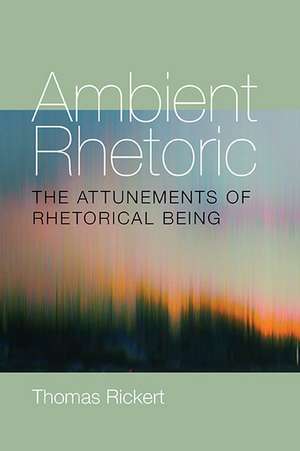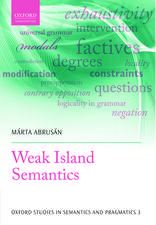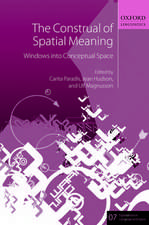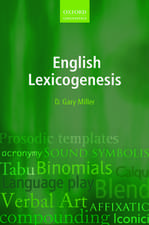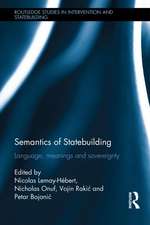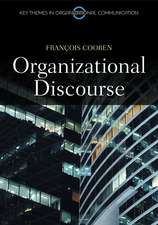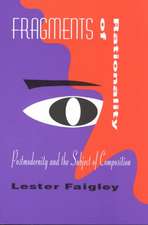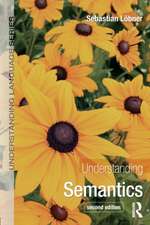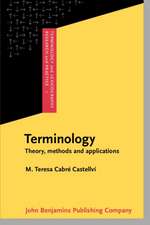Ambient Rhetoric: The Attunements of Rhetorical Being: Composition, Literacy, and Culture
Autor Thomas Rickerten Limba Engleză Paperback – 6 mai 2013
In Ambient Rhetoric, Thomas Rickert seeks to dissolve the boundaries of the rhetorical tradition and its basic dichotomy of subject and object. With the advent of new technologies, new media, and the dispersion of human agency through external information sources, rhetoric can no longer remain tied to the autonomy of human will and cognition as the sole determinants in the discursive act.
Rickert develops the concept of ambience in order to engage all of the elements that comprise the ecologies in which we exist. Culling from Martin Heidegger’s hermeneutical phenomenology in Being and Time, Rickert finds the basis for ambience in Heidegger’s assertion that humans do not exist in a vacuum; there is a constant and fluid relation to the material, informational, and emotional spaces in which they dwell. Hence, humans are not the exclusive actors in the rhetorical equation; agency can be found in innumerable things, objects, and spaces. As Rickert asserts, it is only after we become attuned to these influences that rhetoric can make a first step toward sufficiency.
Rickert also recalls the foundational Greek philosophical concepts of kairos (time), chora (space/place), and periechon (surroundings) and cites their repurposing by modern and postmodern thinkers as “informational scaffolding” for how we reason, feel, and act. He discusses contemporary theory in cognitive science, rhetoric, and object-oriented philosophy to expand his argument for the essentiality of ambience to the field of rhetoric. Rickert then examines works of ambient music that incorporate natural and artificial sound, spaces, and technologies, finding them to be exemplary of a more fully resonant and experiential media.
In his preface, Rickert compares ambience to the fermenting of wine—how its distinctive flavor can be traced to innumerable factors, including sun, soil, water, region, and grape variety. The environment and company with whom it’s consumed further enhance the taste experience. And so it should be with rhetoric—to be considered among all of its influences. As Rickert demonstrates, the larger world that we inhabit (and that inhabits us) must be fully embraced if we are to advance as beings and rhetors within it.
Rickert develops the concept of ambience in order to engage all of the elements that comprise the ecologies in which we exist. Culling from Martin Heidegger’s hermeneutical phenomenology in Being and Time, Rickert finds the basis for ambience in Heidegger’s assertion that humans do not exist in a vacuum; there is a constant and fluid relation to the material, informational, and emotional spaces in which they dwell. Hence, humans are not the exclusive actors in the rhetorical equation; agency can be found in innumerable things, objects, and spaces. As Rickert asserts, it is only after we become attuned to these influences that rhetoric can make a first step toward sufficiency.
Rickert also recalls the foundational Greek philosophical concepts of kairos (time), chora (space/place), and periechon (surroundings) and cites their repurposing by modern and postmodern thinkers as “informational scaffolding” for how we reason, feel, and act. He discusses contemporary theory in cognitive science, rhetoric, and object-oriented philosophy to expand his argument for the essentiality of ambience to the field of rhetoric. Rickert then examines works of ambient music that incorporate natural and artificial sound, spaces, and technologies, finding them to be exemplary of a more fully resonant and experiential media.
In his preface, Rickert compares ambience to the fermenting of wine—how its distinctive flavor can be traced to innumerable factors, including sun, soil, water, region, and grape variety. The environment and company with whom it’s consumed further enhance the taste experience. And so it should be with rhetoric—to be considered among all of its influences. As Rickert demonstrates, the larger world that we inhabit (and that inhabits us) must be fully embraced if we are to advance as beings and rhetors within it.
Din seria Composition, Literacy, and Culture
-
 Preț: 426.79 lei
Preț: 426.79 lei -
 Preț: 430.66 lei
Preț: 430.66 lei -
 Preț: 426.79 lei
Preț: 426.79 lei -
 Preț: 390.71 lei
Preț: 390.71 lei -
 Preț: 388.79 lei
Preț: 388.79 lei -
 Preț: 139.00 lei
Preț: 139.00 lei -
 Preț: 425.86 lei
Preț: 425.86 lei -
 Preț: 388.79 lei
Preț: 388.79 lei -
 Preț: 388.79 lei
Preț: 388.79 lei -
 Preț: 348.83 lei
Preț: 348.83 lei -
 Preț: 210.43 lei
Preț: 210.43 lei -
 Preț: 199.10 lei
Preț: 199.10 lei -
 Preț: 181.71 lei
Preț: 181.71 lei -
 Preț: 422.97 lei
Preț: 422.97 lei -
 Preț: 388.79 lei
Preț: 388.79 lei -
 Preț: 394.57 lei
Preț: 394.57 lei -
 Preț: 386.88 lei
Preț: 386.88 lei -
 Preț: 362.33 lei
Preț: 362.33 lei -
 Preț: 446.05 lei
Preț: 446.05 lei -
 Preț: 390.71 lei
Preț: 390.71 lei -
 Preț: 391.67 lei
Preț: 391.67 lei -
 Preț: 383.01 lei
Preț: 383.01 lei -
 Preț: 358.46 lei
Preț: 358.46 lei -
 Preț: 197.45 lei
Preț: 197.45 lei -
 Preț: 388.79 lei
Preț: 388.79 lei -
 Preț: 359.07 lei
Preț: 359.07 lei -
 Preț: 349.99 lei
Preț: 349.99 lei -
 Preț: 356.55 lei
Preț: 356.55 lei -
 Preț: 387.82 lei
Preț: 387.82 lei -
 Preț: 360.37 lei
Preț: 360.37 lei -
 Preț: 392.66 lei
Preț: 392.66 lei -
 Preț: 425.86 lei
Preț: 425.86 lei -
 Preț: 424.88 lei
Preț: 424.88 lei -
 Preț: 391.67 lei
Preț: 391.67 lei -
 Preț: 386.88 lei
Preț: 386.88 lei -
 Preț: 348.83 lei
Preț: 348.83 lei -
 Preț: 386.88 lei
Preț: 386.88 lei -
 Preț: 389.38 lei
Preț: 389.38 lei -
 Preț: 385.91 lei
Preț: 385.91 lei -
 Preț: 384.92 lei
Preț: 384.92 lei -
 Preț: 385.91 lei
Preț: 385.91 lei -
 Preț: 384.00 lei
Preț: 384.00 lei -
 Preț: 426.79 lei
Preț: 426.79 lei -
 Preț: 350.79 lei
Preț: 350.79 lei -
 Preț: 386.88 lei
Preț: 386.88 lei -
 Preț: 350.79 lei
Preț: 350.79 lei -
 Preț: 383.01 lei
Preț: 383.01 lei -
 Preț: 350.79 lei
Preț: 350.79 lei -
 Preț: 385.91 lei
Preț: 385.91 lei
Preț: 426.79 lei
Nou
Puncte Express: 640
Preț estimativ în valută:
81.69€ • 84.96$ • 68.45£
81.69€ • 84.96$ • 68.45£
Carte tipărită la comandă
Livrare economică 13-27 martie
Preluare comenzi: 021 569.72.76
Specificații
ISBN-13: 9780822962403
ISBN-10: 0822962403
Pagini: 360
Ilustrații: 8 b&w Illustrations
Dimensiuni: 152 x 229 x 23 mm
Greutate: 0.54 kg
Ediția:1
Editura: University of Pittsburgh Press
Colecția University of Pittsburgh Press
Seria Composition, Literacy, and Culture
ISBN-10: 0822962403
Pagini: 360
Ilustrații: 8 b&w Illustrations
Dimensiuni: 152 x 229 x 23 mm
Greutate: 0.54 kg
Ediția:1
Editura: University of Pittsburgh Press
Colecția University of Pittsburgh Press
Seria Composition, Literacy, and Culture
Recenzii
"'Ambient Rhetoric' continually opens new possibilities of thinking about rhetoric, ecology, and sustainability, possibilities that emerge and withdraw in a constant flux of interrelatedness."
—Rhetoric Review
—Rhetoric Review
"Offers its careful recreation of pathways and concepts . . . from which to build future work on ambience, digital space and other emerging research interests in the field, so emerging that they do not yet have a bedrock of concepts from which to build. . . . Rickert's work offers a much needed repository for more emergence, more ways to practice and think through inhabitable rhetoric(s), sustainable rhetorics, as a thing that comes from the world."
—Enculturation
—Enculturation
“Rickert brings together four fields of thought—contemporary cognitive science, phenomenology, 20th-century ambient music, and theories of materiality—to further the theoretical scope of rhetoric. . . . Despite the rigor and density of the work, it is readable and accessible; indeed, it is at times playful with references to the lyrics of popular songs often supplementing references to poets, theorists, and philosophers. . . . An important piece of conceptual inquiry that could prove foundational for the field in years to come. Highly recommended.”
—Choice
—Choice
"Rickert provides vocabulary, concepts and an ambient theory for scholars of rhetoric who are pushing on the boundaries of some of these traditional ideas about what we generally and typically hold up as our theories of rhetoric."
—Composition Forum
—Composition Forum
“Thematically, Ambient Rhetoric is at the cutting edge of rhetorical theory in the US context. . . . What would it mean for rhetoric to reside outside the control of human agency? The strength of Rickert’s book is the rich response to this question.”
—Daniel M. Gross, University of California, Irvine
—Daniel M. Gross, University of California, Irvine
“Ambient Rhetoric will immediately find an audience of rhetorical scholars who will want to grapple with its many provocative directions. Not only is it a well-conceived and well-executed book, but it is an important one."
—John Muckelbauer, University of South Carolina
—John Muckelbauer, University of South Carolina
Notă biografică
Thomas Rickert is associate professor of English at Purdue University and author of Acts of Enjoyment: Rhetoric, Zizek, and the Return of the Subject, winner of the 2007 JAC Gary A. Olson Award.
Descriere
In Ambient Rhetoric, Rickert seeks to dissolve the boundaries of the rhetorical tradition and its basic dichotomy of subject and object. With the advent of new technologies, new media, and the dispersion of human agency through external information sources, rhetoric can no longer remain tied to the autonomy of human will and cognition as the sole determinants in the discursive act.
Rickert develops the concept of ambience to engage all of the elements that comprise the ecologies in which we exist. Culling from Martin Heidegger’s Being and Time, together with foundational Greek philosophies and contemporary theory in cognitive science, rhetoric, and object-oriented philosophy, Rickert finds the basis for ambience in assertions that humans do not exist in a vacuum—there is a constant and fluid relation to the material, informational, and emotional spaces in which they dwell.
Rickert develops the concept of ambience to engage all of the elements that comprise the ecologies in which we exist. Culling from Martin Heidegger’s Being and Time, together with foundational Greek philosophies and contemporary theory in cognitive science, rhetoric, and object-oriented philosophy, Rickert finds the basis for ambience in assertions that humans do not exist in a vacuum—there is a constant and fluid relation to the material, informational, and emotional spaces in which they dwell.
